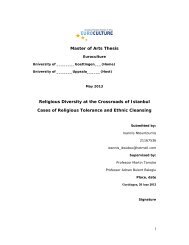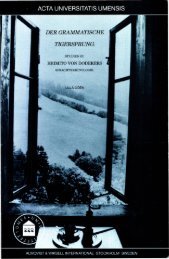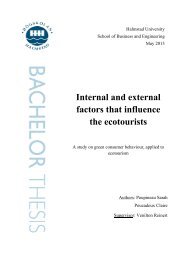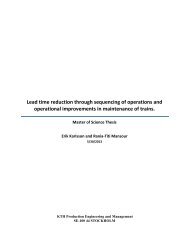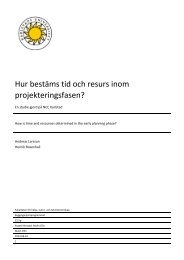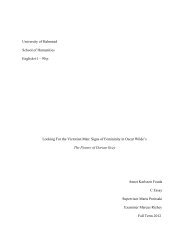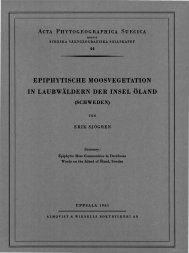fulltext - DiVA Portal
fulltext - DiVA Portal
fulltext - DiVA Portal
- No tags were found...
Create successful ePaper yourself
Turn your PDF publications into a flip-book with our unique Google optimized e-Paper software.
The subjects were twelve pre-school teachers, of whom eleven were alsoobserved for a period of fifteen hours in the group of children Three of themworked in part-time groups. Nine of them worked in day nurseries in groups withlarge age differences. The study also included a group of twenty-one trainee preschoolteachers who were interviewed both at the beginning of their teachertraining and after completing their education 2,5 years later. The trainee teacherswere also included in the two classification items.All interviews, both the interviews with the professionally active pre-schoolteachers and the two interviews with the trainee teachers provided data for theanalyses. The interviews were analysed with regard to notions of pre-school andwith regard to conceptions of work, play and learning.The different categories from the interview analyses served as tool ofinterpretation for the analyses of the observations. This made it possible tocompare the pre-school teachers' own conceptions of work, play and learning withwhat they actually do in their work.RESULTSThe professionally active pre-school teachers in this study had notions of preschoolthat could be brought together to three qualitatively different categories ofnotions. Some pre-school techers had notions of pre-school as "an institution forcompensation". Most of them thought of pre-school as "an institution foradjustment". A minority of the pre-school teachers regarded pre-school as "aninstitution for development". Some differences between the categories lie in theopinions of what pre-school expect to give the children, in the time perspective forthe goal fulfilment and in the possibilities mentioned for change and improvementof pre-school.The three categories can also be described in the dimension of "society -individual". According to the "idea of compensation" pre-school is, at least partly,regarded in a fairly long-term social perspective, where it can contribute to creatingequality in society. The "idea of adjustment" focuses on the level of activities, onthe importance of teaching pre-school children rules and normes, and on theimportance of pre-school for children's entry into compulsory school. The "idea ofdevelopment" emphazises the individual's own development and the indiviual preschoolteacher's responsibility for the work and for the goal fulfilment.The pre-school teachers in this study had also different conceptions of work,play and learning. The various conceptions of these activities could also bebrought together to three different categories for each concept.Regarding to work the conceptions can, in simplified terms, be described as "anadult phenomenon", that it is the duty of children to carry out "assign tasks", orthat work is synonymous with "childrens play". The most common conception ofwork in pre-school was that of "assigned tasks".Plav in pre-school was regarded as "a diagnostic instrument", "a teachingmethod" or as "a therapeutic necessity". The conceptions of play as "a teachingmethod" or as "therapy" had the same prevalence in this group.The pre-school teachers regarded learning as "concept formation and intellectualdevelopment", as "social training and proficiency training" or as "higher185



